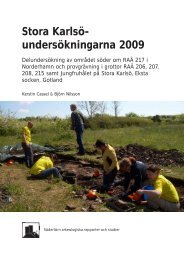CIVIL SOCIETY IN PEACEBUILDING - A Case Study Analysis of ...
CIVIL SOCIETY IN PEACEBUILDING - A Case Study Analysis of ...
CIVIL SOCIETY IN PEACEBUILDING - A Case Study Analysis of ...
You also want an ePaper? Increase the reach of your titles
YUMPU automatically turns print PDFs into web optimized ePapers that Google loves.
10. ConclusionThis concluding chapter presents general conclusions from the research and discusses further researchthat can be addressed in in-depth case study researches. A good understanding <strong>of</strong> civil society’s role isrequired when civil society aims to have an impact on peacebuilding. This is equally important fornational or local societies and their strategies as well as for outside supporters. However, this essayconcludes that the civil society and its function in peacebuilding discourse and development lead to agreater understanding <strong>of</strong> the role <strong>of</strong> civil society in peacebuilding within states.This study also demonstrates that it is necessary to analyze the enabling conditions for civil society t<strong>of</strong>ulfil a constructive role in peacebuilding. Not only is it necessary to identify the relevant functions <strong>of</strong>civil society within peacebuilding, but also the composition <strong>of</strong> civil society, especially in nondemocraticcountries like Sudan. Traditional groups, social movements and mass organizations are veryimportant civil society actors in peacebuilding that need to be considered more systematically. Civilsociety has therefore important roles to play in peacebuilding, if they have the right functions.Democracy and peacebuilding research shows that civil society has played a crucial role indemocratic transitions in Eastern Europe after the Cold war. This study demonstrates that civil societycan make important contributions to peacebuilding in the short, medium and long run. The most strikingresult in civil society peacebuilding research shows a direct correlation between civil societyinvolvement in peace negotiations and the sustainability <strong>of</strong> agreements- the greater the involvement <strong>of</strong>civil society the more likely the peace agreements will be sustained. The most important civil societyfunction in peacebuilding seems to be advocacy, particularly in terms <strong>of</strong> making the voices <strong>of</strong> civilsociety heard and bridging important issues to the peacebuilding agenda. Other civil society roles arealso important <strong>of</strong> civil society, and through joint activities that can build bridging ties across dividedsocieties.Not all civil society functions are equally effective in all phases <strong>of</strong> conflict. It is also important torecognize that depending on the functions <strong>of</strong> civil society, these will have different priorities dependingon the phases <strong>of</strong> conflict. During armed conflict or in the immediate aftermath the functions <strong>of</strong>protection, monitoring and public communication seem to have clearly priority. Civil society needs afunctioning state to operate effectively and therefore the role <strong>of</strong> the state is equally important. Due toweakness <strong>of</strong> the state and unclear power relations and networks, civil society is affected by a strongauthoritarian state that suppresses civil society. In the case <strong>of</strong> a weak state, civil society support mayneed to focus on the enabling environment, including support to state structures and law enforcement aswell as specific support to civil society functions.29
















